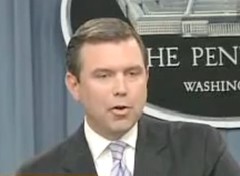A statement from the Pentagon was published just after 9 pm ET on April 24th, no more than an hour or two after the New York Times had posted their package covering the Gitmo Files they had not obtained from WikiLeaks. The statement was posted on NPR and the Times website. Yet, again, it seems this is an instance of complete collusion between the press and government.
Michael Calderone reports "representatives from NPR and the Times visited the White House and spoke with Pentagon spokesman Geoff Morrell and members of Joint Task Force Guantanamo." And, "The news organizations agreed to some redactions requested by government officials but not all of them."
Recall, in February, it was found out that the Times had met with the State Department prior to their release of the US State Embassy Cables. Marcy Wheeler over at Firedoglake highlighted NYT's close cooperation with the State Department:
Because of the range of the material and the very nature of diplomacy, the embassy cables were bound to be more explosive than the War Logs. Dean Baquet, our Washington bureau chief, gave the White House an early warning on Nov. 19. The following Tuesday, two days before Thanksgiving, Baquet and two colleagues were invited to a windowless room at the State Department, where they encountered an unsmiling crowd. Representatives from the White House, the State Department, the Office of the Director of National Intelligence, the C.I.A., the Defense Intelligence Agency, the F.B.I. and the Pentagon gathered around a conference table. Others, who never identified themselves, lined the walls. A solitary note-taker tapped away on a computer.
The meeting was off the record, but it is fair to say the mood was tense. Scott Shane, one reporter who participated in the meeting, described "an undertone of suppressed outrage and frustration."
Subsequent meetings, which soon gave way to daily conference calls, were more businesslike. Before each discussion, our Washington bureau sent over a batch of specific cables that we intended to use in the coming days. They were circulated to regional specialists, who funneled their reactions to a small group at State, who came to our daily conversations with a list of priorities and arguments to back them up. We relayed the government's concerns, and our own decisions regarding them, to the other news outlets.
Once again, the Timesopted to subvert its duty and be for the State instead of fully owning its role as a member of the Fourth Estate. It chose to cover for power instead of covering power. [Unfortunately, on matters of national security and war, this is what typically happens.]
Pentagon Press Secretary Geoff Morrell's statement is a well-prepared statement. It does not simply condemn the release of the files and then make a general note about the US and how it is committed to upholding human rights and so on and so forth. The statement clearly outlines that a Guantanamo Task Force was established in January 2009 and suggests that the material published may be outdated because the Task Force has made assessments of detainees and those reports were not released.
The statement also claims, "Both the previous and the current Administrations have made every effort to act with the utmost care and diligence in transferring detainees from Guantanamo." That may be mostly true, as the US State Embassy cables released by WikiLeaks indicated Guantanamo detainees had been used as "bargaining chips." American diplomats bargained with countries to help empty the prison by resettling detainees. They told Slovenia if it wanted to get a meeting with President Barack Obama. They offered Kiribati incentives "worth millions of dollars to take Chinese Muslim detainees." Diplomats suggested to Belgium that by taking detainees it could be a "low-cost way for Belgium to attain prominence in Europe."
If the process of resettling has not worked as planned, perhaps the manner in which the US went about trying to resettle detainees is partly to blame for the inconvenience these terror suspects have caused the supreme power. Or, perhaps, the fact that, as Amy Davidson of the New Yorker writes , the US reasoning for detaining individuals does "not always really involve a belief that a prisoner is dangerous to us or has committed some crime; sometimes (and this is more debased) we mostly think we might find him useful"--Perhaps, that has something to do with the complications being experienced.
The Pentagon statement notes the "previous Administration transferred 537 detainees; to date, the current Administration has transferred 67" Former President George W. Bush occupied the position of US President of the United States for eight years. That means on average Bush released 67 detainees each year of his presidency. But, actually, that's a poor calculation because the first detainee wasn't released from Guantanamo until 2002. So, in reality, Bush released an average of 89 detainees each year he was president.
How many detainees has Obama released each year thus far? About 34 detainees each year. And, unlike Bush, President Obama was actually committed to closing Guantanamo.
The statement continues, "Both Administrations have made the protection of American citizens the top priority and we are concerned that the disclosure of these documents could be damaging to those efforts."
The "security" of American citizens is of so much concern that detainees are a different class of people in the United States. They are de-human and not allowed civilian trials in the United States. They are "enemy combatants" and not prisoners of war and thus are not able to claim protections under the Geneva Conventions.
Finally, the statement concludes, "We will continue to work with allies and partners around the world to mitigate threats to the U.S. and other countries and to work toward the ultimate closure of the Guantanamo detention facility, consistent with good security practices and our values as a nation."
(Note: You can view every article as one long page if you sign up as an Advocate Member, or higher).






